Monorail
Seattle, at the old World's Fair
He stands by the helm, his face full of blue
from the buildings at twilight, his hand
knuckled around a metal pole that keeps him
from falling, as he flies past the vaults
of startled mannequins, the red ohs of their lips.
Christmas lights are also falling
through the windshield, onto his chest:
right side green, left side red —
dark then back again.Wait…my father is not moving yet:
no one has claimed the worn leather throne.
But his thoughts are moving, wondering
whether movement is the same as growing old
in the province of space, not time. Inside his shoes,
his toes are as blue as the city streets,
and the drum in his chest, his red-lit chest,
is growing dim. He knows the train he's about to ride
has one rail: no steering, no turns.
And the only skill is in the brake.The brake. His lips roll over the words:
the dead man's brake. And a small boy
— come to ride up front — hears him,
tugs my father's coat and asks:
Hey mister, are you the driver of this train?
Celebrating Lucia Perillo
Lucia Perillo died on October 16 of this year. A MacArthur Genius who was shortlisted for the Pulitzer, Perillo was a poet of crafted precision, observation, and wit. John W Marshall, previous owner of Open Books, eulogized her for us, in this review.
As you probably know, we run an original poem from a local poet each Tuesday. Each poet recommends the next, in a chain that takes us places a call for submission never would: we travel on the tastes and friendships of poets.
Last December, after the death of Madeline DeFrees, we ran five of her poems. We never planned on this being macabre tradition, but it seemed fitting to us to honor Perillo in the same way. We are very lucky that this was made possible Copper Canyon Press, home to both DeFress and Perillo.
So, once again, our grateful thanks to Joseph Bednarik, co-publisher of Copper Canyon Press, for this gracious permission. Last year, Paul Constant wrote something about Copper Canyon that goes just as well here today for Perillo as it does for DeFrees:
Copper Canyon is that rarest of publishers: they understand the sacredness of their charge, the fact that they are not the owners of the words they publish so much as their temporary stewards. Quite simply, DeFrees could not have chosen better guardians for her legacy; Copper Canyon will keep her poems alive for generations to come.
The first of our picks goes up today around 10am, and another three will follow on the subsequent Tuesdays. If you like what you see, we heartily recommend Time Will Clean the Carcass Bones, released by Copper Canyon last February. It's a powerful work, a beautifully designed and printed book. In fact, picking up two copies from a local bookstore — one for a holiday gift for a friend, and one for yourself, of course — would be highly recommended.
Our normal poetry cycle will resume in January after this month-long focus on the work of a poet we are so sorry to have lost.
Artist Trust just spread the word today:
Artist Trust is excited to announce that writer Peter Mountford is receiving the 2016 Gar LaSalle Storyteller Award. The Gar LaSalle Storyteller Award is an unrestricted award of $10,000 given to a Washington State fiction writer whose work demonstrates excellence in storytelling. This is the second year the award has been given. Last year’s recipient was Anca Szilágyi.
A name known all around Seattle's writing community, Peter Mountford is the author of the novels A Young Man's Guide to Late Capitalism, which won the 2012 Washington State Book Award for fiction, and The Dismal Science, which in 2014 was a New York Times Editor's Choice. He's been published widely, from the Atlantic, to New York Times Magazine, to the Sun. Plus, if you've seen a heroically amazing writer talk at Hugo House in the last few years, odds are that they appeared because Mountford asked them, in his capacity as events curator.
But of course, this recognition comes because of his phenomenal writing, which was the word Paul Constant used to sum up The Dismal Science. Mountford is a fine writer, and there is no doubt he'll put the time that money will buy him to very good use. Congratulations to him; he now joins the fine company of Anca Szilágyi as the two recipients of this still-new, exciting prize.
The long memory of the Civil War
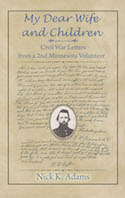
Our sponsor this week is Nick K Adams, and his book My Dear Wife and Children: Civil War Letters From a 2nd Minnesota Volunteer is a remarkable document. Adams has transcribed his great-grandfather's letters about going to war, and offered context and editorial notes to help explain his experience.
The letters span a number of years, from their author, David Brainard Griffin, signing up, through battles and the pain of missing a family when away at war. It's a moving, startling document, remembering just what soldiers have gone through, just as long as we've had wars. You can read excerpts from two letters on our sponsor's page. This book would be a great holiday gift for that person on your holiday list who loves history, and for whom the Civil War might hold some contemporary parallels.
Sponsors like Nick K Adams make the Seattle Review of Books possible. Did you know you could sponsor us, as well? Get your stories, or novel, or event in front of our passionate audience. We only have two dates left in our current block. Take a glance at our sponsorship information page for dates and details.
A journey into the head of a stalker
Published December 05, 2016, at 11:46am
What happens when an author who has written a book about being stalked then goes on to write a thriller about a stalker?
A bookseller's holiday: Two new titles from Nightboat Books
(Every Monday in December, we're asking a local bookseller which books they'd like to receive for a holiday gift. Our first bookseller is Wesley Minter, who works at Third Place Books Seward Park. Wesley chose Proxies by Brian Blanchfield and In the Empire of the Air by Donald Britton.)
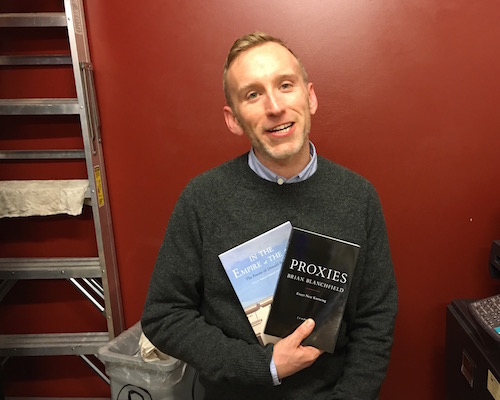
They're both by Nightboat Books, a publisher I've only been aware of for a little while. They started with the collected poems of Tim Dlugos. They're dedicated to lost queer writers with an emphasis on poetry and radical essays and things like that, especially by artists we lost in the AIDS crisis in the 80s. They're committed to the cause of illuminating what we lost in this giant tragedy. So far, every single one is just this previously unknown treasure, and the timber and the tone of each book is wildly different than the last. I'm a huge supporter of what they're putting out. The quality control of the work they're doing in that office — I'm sure it's a very small office — is really impressive.
The Sunday Post for December 4, 2016
Now is the time to talk about what we are actually talking about
Sometimes you try to turn off the relentless media engine that is the Donald Trump pre-presidency, just for a few hours – then get an eloquent reminder of why none of us can afford the luxury.
This piece by Nigerian novelist and MacArthur Genius Chimamanda Ngozi Adichie is the call to action we need right now. Clear-eyed, urgent, and right:
Now is the time to counter lies with facts, repeatedly and unflaggingly, while also proclaiming the greater truths: of our equal humanity, of decency, of compassion. Every precious ideal must be reiterated, every obvious argument made, because an ugly idea left unchallenged begins to turn the color of normal. It does not have to be like this.
Unclaimed: Two countries, thousands of families, and a 16-year quest to identify a silent man in a bed
A truck crashes in the desert near Mexico, and the survivor becomes a human palimpsest: without a name, a memory, or a voice, he offers to fulfill the dream of reunion for families separated by a border. At the end of this gently investigatory piece by Brooke Jarvis, there’s an answer to his mystery — but one that breaks as much as it mends. A great human story, and a revealing look at the surprisingly (or unsurprisingly) vast network that helps immigrant families find members lost in a border crossing.
People began to contact the hospital, to ask detailed questions about his moles or his scars ... Each had a son or brother or husband or cousin or friend who’d headed northward and then disappeared, leaving no answers about what might have happened to him, whether he was dead or incarcerated or suffering somewhere, whether he’d abandoned them. In the anguish of their uncertainty, they looked to the man in the bed and saw hope. They peered into his empty past and saw the possibility of themselves.
The first year, there were dozens of these families. Eventually, there would be thousands.
Inside Alphabet’s Jigsaw, the powerful tech incubator that could reshape geopolitics
First off, did everyone else already know that Google’s code of conduct has shifted from “Don’t be evil” to “Do the right thing”? One can only imagine the hours of corporate copywriter angst inspired by that change … while speculating on the subtle moral distinction.
Regardless, you should read this piece about Jigsaw, Google’s Alphabet’s tech incubator intended to tackle “geopolitical challenges.” Tech innovation for social good has been on the rise for some years, but we may be reaching a boiling point — e.g., the recent entry into the philanthropic fray by Facebook’s Mark Zuckerberg.
These tech juggernauts bring invaluable expertise and ingenuity to the table — but not necessarily the nuance and experience that the nonprofit sector has learned over decades. Worth watching.
Jigsaw wants to be politically neutral, but it also wants to make an impact by assisting activists and journalists engaged in the messy business of real-world politics. That is not an easy balance to strike. If its products work, they could have complicated knock-on effects — for example, empowering a regime’s critics to spread their message online, thereby shifting the local balance of power and perhaps even provoking violent unrest.
And so, while Jigsaw is clear on its core values, it could benefit from clarifying its procedural philosophy. Should Jigsaw base its choices simply on whether they go hand in hand with “good” principles, like opposition to censorship, or should its decisions be judged by their consequences?
The true story of Nintendo's most wanted game
And now, an epic quest in a completely different vein: the story of a video game whose price rose to the hundreds of thousands — though even its most ardent collectors acknowledge that it’s just not very much fun. Justin Heckert tracks lives changed and pocketbooks emptied by the rare (and almost unplayable) Stadium Events.
It was a blurry photo, but the words stamped on the side of the case came through clear enough: BANDAI AMERICA, INC. STADIUM EVENTS. 6PCS. Tom posted the picture on NintendoAge.com, the largest online gathering place for fans and collectors, with the title: After years of waiting ... it is here and it's beautiful!
"That's when the frickin' s---storm happened," Tim says. "I should've kept my big mouth shut."
Decades in the Making: Fidel Castro’s Obituary
Oh, the agony of a public typographical error! After Fidel Castro’s death, the Internet was abuzz (admittedly business as usual) over CNN’s obituary, which included the telling line: “Fidel Castro outlived six of those presidents … [[Note: Change to seven if George H.W. Bush dies before Castro]].”
A flurry of articles followed to unpack the practice of keeping advance obits for public figures on file — and update them over the course of a life. The New York Times has one of the best, told by the 16 journalists who shared responsibility for the newspaper’s final words on Fidel.
For years, as we weathered one scare after another that Fidel Castro had died, I kept the Cuba plan close at hand. We had lists of every Times reporter who either had experience with or family ties to Cuba. Some would go straight to Miami; others would try various routes to Cuba, even though no one had visas. The former executive editor, Bill Keller, and I made a pilgrimage to Havana in 2009 to plead for better access, to no avail, although I did have my copy of “Love in the Time of Cholera” signed by Gabriel García Márquez, a career highlight.
We even had a plan to sneak someone in via the southeastern city of Santiago de Cuba, where Fidel launched the revolution in 1953 and proclaimed victory in 1959 ...
52 things I learned in 2016
Hat tip to the inimitable Jason Kottke for unearthing this piece by Tom Whitwell of Fluxx. While it puts this column at risk of joining the year-end list frenzy (and also of linking to a list from a list), Whitwell’s collection of insights is charming, unusual, and perfect for Sunday-in-December browsing. A few favorites below.
- 8. Australian musicians have performed with a synthesiser controlled by a petri dish of live human neurons: “The neurons were fed dopamine before the gig and went ballistic. The interaction with the drummer was very tight. The drum hits are processed into triggers and sent to the neurons.”
- 14. A Californian company called Skinny Mirror sells mirrors that make you look thinner. When installed in the changing rooms of clothes shops, they can increase sales by 18%.
- 28. Tuareg guitar players really like Dire Straits.
- 33. When they launched, both Mastercard and Visa were not-for-profit membership organisations.
- 42. Japan Airlines serves KFC to economy class travellers during the Christmas season. The in-flight KFC has 15% more salt to compensate for the lower pressure and humidity.
People Of Color Take Over Fantastic Stories - Kickstarter Fund Project #48
Every week, the Seattle Review of Books backs a Kickstarter, and writes up why we picked that particular project. Read more about the project here. Suggest a project by writing to kickstarter at this domain, or by using our contact form.
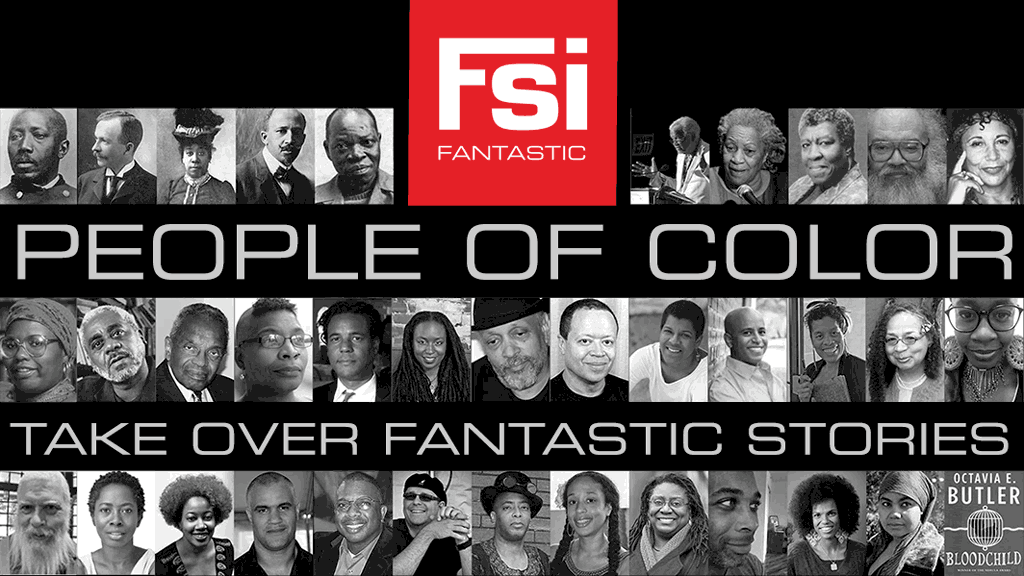
What's the project this week?
People Of Color Take Over Fantastic Stories. We've put $20 in as a non-reward backer
Who is the Creator?
What do they have to say about the project?
Fantastic Stories is a top paying market that is open and looking for stories from underrepresented communities and cultures.
What caught your eye?
Well, first, we need to offer a complete and total nepotism / conflict of interest report: Nisi Shawl, who writes our SFFH column the Future Alternative Past, is the guest editor in question if this Kickstarter succeeds, so let us say this clearly and without reserve: you cannot trust our objectivity on this.
But still, are you kidding me? A complete POC take over issue is a fantastic idea, and good on Fantastic Stories of the Imagination (for those of you, like me, who were curious about the title's remarkable resemblence to ye olde classic Fantastic Stories, editor Warren Lapine tells the story here) for taking this important step. This is the kind of project we like funding. Also, Nisi explains it well in the video, so please do watch that.
Why should I back it?
Because there are people that actually complain about stuff like this. Did you know that? People who think its "politically correct" or "reverse-racist", or something equally idiotic, to focus a magazine on people of color. As Nisi says "there persists a perception that science fiction and fantasy is somehow a white field". Now, that's just stupid. In an article on the website, Nisi points out black people have been involved with the genre since the very beginning.
As fans, it's imperative to stand up and say that what we care about most is good stories, and the authors she's picked to highlight are certainly going to deliver on that front. Let's make sure they get the chance, yes?
How's the project doing?
They're just getting started, at 13% funded, and 32 days to go.
Do they have a video?
Kickstarter Fund Stats
- Projects backed: 48
- Funds pledged: $960
- Funds collected: $800
- Unsuccessful pledges: 2
- Fund balance: $80
"If you fear change, you’ll be horrified to learn that this new site is more than just a cosmetic improvement," is how they put it, before informing us that they are releasing their complete digital archive. Every single piece from their archive is available. Like The New Yorker, or Harper's, it comes at a price: a subscription to the magazine.
But, like always, their writer's interviews are available for free. It's one of the best online resources to learn from absolute masters of the craft, many of whom are now long dead, and have achieved the kind of mythical status that almost makes you surprised they ever were interviewable at all.
Here are just a few standouts of the hundreds available:
- The first in the series! E. M. Forster, The Art of Fiction No. 1
- Know your facist poets: Ezra Pound, The Art of Poetry No. 5
- Know your memoirists: Mary Karr, The Art of Memoir No. 1
- Know your "I'm so talented I get interviewed twice, once for fiction and once for non-fiction" writer: Joan Didion, The Art of Nonfiction No. 1, and Joan Didion, The Art of Fiction No. 71
- Know them before their work was made insidious musical (but still have the pernicious Jellicle Cats stuck in head while you write): T. S. Eliot, The Art of Poetry No. 1
- Know your micro-story artisans: Lydia Davis, Art of Fiction No. 227
- Know your gentile British humorists: P. G. Wodehouse, The Art of Fiction No. 60
- And your iconoclastic British lesbian feminists: Jeanette Winterson, The Art of Fiction No. 150
- Your understated, brilliant, British philosopher queens: Iris Murdoch, The Art of Fiction No. 117
- Your wonderful American Science Fiction inspirational favorites: Samuel R. Delany, The Art of Fiction No. 210
- Your creator, from whose library you may read every infinite variation of every one of these interviews in any imaginable form: Jorge Luis Borges, The Art of Fiction No. 39
- Your mysterious, and never unveiled (so we will pretend in happy ignorance) Italian hagiographer: Elena Ferrante, Art of Fiction No. 228
- Your long missed — especially in this political landscape when we need her voice so badly — American intellectual who always had an amazing thing or two to say that would challenge your world view: Susan Sontag, The Art of Fiction No. 143
- Your unnerving British urban social archaeologist: J. G. Ballard, The Art of Fiction No. 85
- Your butterfly collector: Vladimir Nabokov, The Art of Fiction No. 40
- Your Japanese wonderman: Haruki Murakami, The Art of Fiction No. 182
- Your actual Faulkner: William Faulkner, The Art of Fiction No. 12
The Help Desk: a twofer! NaNoWriMo hangovers and teenage (heart) kicks
Every Friday, Cienna Madrid offers solutions to life’s most vexing literary problems. Do you need a book recommendation to send your worst cousin on her birthday? Is it okay to read erotica on public transit? Cienna can help. Send your questions to advice@seattlereviewofbooks.com.
Dear Cienna,
I hate it. I wrote it in November, all 50-fucking-thousand words (and change, I made good time, thanks to bowing out of Thanksgiving with my fuck-you-we-won-you-beta-liberal relatives). But seriously, this is the biggest pile of dreck that’s ever been pushed out of a mind-hole in a full-moon’s measure.
But the idea is good, and some of the characters are…not bad? And, there were a few times, just reading it again, where I actually made myself laugh. I guess my question is: what the hell do I do now? I feel like I went and bought all the materials to make a house, like in an old Sears Catalog, and they showed up all jumbled and without the instruction manual.
Jackie, Montlake
Congratulations Jackie,
You have completed an activity that, like childbirth, is completely voluntary and when executed improperly can lead to vaginal tearing. What do you do now? Put your manuscript in a drawer and forget about it. Buy yourself a steak (or whatever the bulgur wheat equivalent of steak is, if you're into that sort of thing), cook it medium rare and eat it with your bare hands in a hot bath while fist pumping. Pay no mind to all the blood — that is what the bath is for!
Three months from now, take your manuscript out of its drawer and give it another read. This time, highlight all of the sections that make you laugh, think, or generally make you proud of your brain. Take these pieces out and discard the rest. Now grab an old-timey pen and paper and head back to the bathtub (dry this time). Hunker down, crinkle up your knees, and start asking yourself questions: What is the setting — what does it look, smell and sound like? Are the rules different in this world? Who are your characters, what hierarchical place do they inhabit and what are their motivations? What task are one or more of them trying to accomplish and what is blocking them from reaching their goals? What is the conflict? Is it time sensitive? How will it be resolved? Are your characters reliable narrators or are they liars? Do you have enough to say to write a novel-length piece or is this more of a novella or strong short story? Who do you imagine your audience to be?
Once you have the answers to these questions, start drafting up a detailed chapter-by-chapter outline. This will provide you with a loose roadmap to follow while you work on your second draft. If you find that you like the writing process when it's not as needlessly stressful as sexually-charged gunplay (gun-charged sex play?), consider joining a writing group or sign up for a writing class. No one knows how to write a book until they write a book, but having people who are willing to read your work in progress and offer feedback certainly helps.
Kisses,
Cienna
BONUS QUESTION
Dear Cienna,
I am totally crushing on this girl and I saw her in class looking at this website and so I went and looked and saw your column and thought maybe she likes books and maybe if she saw my letter in your column she would know who it was from and then maybe she would talk to me and we could maybe go to a bookstore or something. Or like maybe you could just tell me a good love poem to write on paper and give to her.
Jack with the purple hair, the library
Dear Jack,
Maybe you could just try saying "hi" sometime? Ah, what the hell, here's a poem for you:
You seem to like books
And I seem to like you
If I plagiarize your favorite love poem
Perhaps you'll like me, too?
Kisses,
Cienna
Portrait Gallery: Charles Johnson
Each week, Christine Marie Larsen creates a new portrait of an author for us. Have any favorites you’d love to see immortalized? Let us know
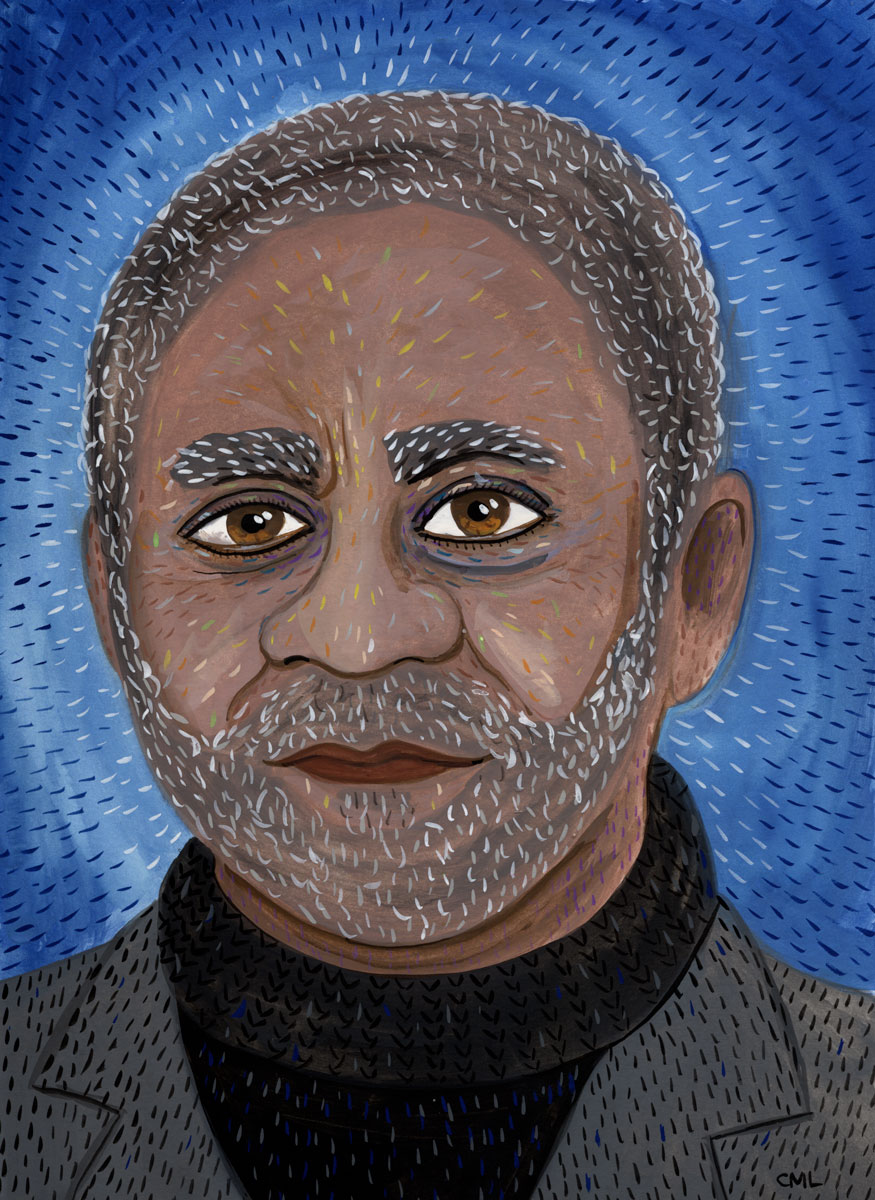
Tuesday December 6th:
The Way of the Writer Reading
Charles Johnson is a Seattle-area legend. The UW professor and National Book Award-winning novelist’s latest book collects a lifetime of learning under the ambitious title The Way of the Writer: Reflections on the Art and Craft of Storytelling. Tonight, Johnson will talk onstage with one of his prize students, the novelist David Guterson.
Northwest African American Museum, 2800 S. Massachusetts St., 624-6600, http://elliottbaybook.com. Free. All ages. 7 p.m.
Thursday Comics Hangover: Another new start for Wonder Woman
The big problem with Wonder Woman, the reason why the character has had a hard time taking hold, is that DC Comics keeps restarting her from scratch. I can't keep track of how many times I've seen the Wonder Woman character rebooted and relaunched. Sure, other DC mainstays like Batman and Superman tend to wallow in retellings of their origin stories, but those stories never seem to change as much as Wonder Woman's.
Batman's parents always get shot. Superman's always rocketed from the planet Krypton into a field in Kansas. But Wonder Woman? Seriously, who the hell knows what's going on with Wonder Woman? Her origin has been retold with varying levels of camp and seriousness and pretentiousness many times over the years, and so as a result it's all become a kind of narrative static.
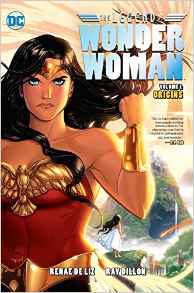
Or at least, that's what I thought. But I just read another retelling of the Wonder Woman origin story, in the form of a hardcover collection called The Legend of Wonder Woman Volume 1: Origins by Renae De Liz and Ray Dillon, and it's the first Wonder Woman story that's kept my attention in years.
Legend is an all-ages-friendly retelling of the Wonder Woman story set during World War II. De Liz's art is dynamic and manga-influenced, which is perfect for the unique blend of mythology and historical detail that Wonder Woman demands. You won't find the rippling abs of modern superhero comics here; De Liz's figures are dynamic, but not over-idealized.
The story takes its sweet time to unfold. We start with a young Amazonian princess named Diana who is trying to figure out her place in the world, and more than half the book passes before her costume makes an appearance. Tonally, Legend makes a major shift at the halfway mark. The first part of the book is more like a young adult novel featuring a pensive lead who isn't sure if she should embrace her legacy, and the second half is a straightforward origin story with all the comedy and economy of a lively animated film.
These two tones might feel out of place were it not for the main character. Diana is a terrific protagonist. She doesn't demonstrate the ridiculous aw-shucks humility of Clark Kent or the dull perfection of Bruce Wayne. Instead, she's a quiet observer with a strong sense of right and wrong. She feels duty-bound to act, but she's equally duty-bound to make sure that her actions are the right ones. Without the first half of the book to establish Diana's thoughtfulness, the second half wouldn't be nearly as much fun.
Until The Legend of Wonder Woman, I didn't have a Wonder Woman comic that I could unhesitatingly give to a girl looking for an introduction to the character. Now I do: she's a strong female lead who's smart, interesting, and she beats the stuffing out of Nazis. What's not to love?
The Hollywood Reporter got the scoop: Hugh Jackman and Fox 2000 are helping to bring Seattle author Sherman Alexie's popular YA novel The Absolutely True Diary of a Part-Time Indian to a theater near you. Alexie, who has directed films in the past, will write the screenplay for the adaptation. Jackman will also play a supporting role in the film. This is a big damn deal for a book that has demonstrated remarkable longevity with young readers. Hopefully, with Alexie's involvement, Fox and Jackman will do the book justice.
Bernie Sanders is the last Democrat standing
Published December 01, 2016, at 9:50am
Last night, Bernie Sanders promoted his new book at a reading in Seattle, and he demonstrated why he's the closest thing to a leader that the Democratic Party has right now.
The Institute for Local Self-Reliance "estimates that Amazon is now capturing nearly $1 in every $2 that Americans spend online."
Regarding Lucia Perillo
Published November 30, 2016, at 12:30pm
When Lucia Perillo passed away in October, the Seattle area lost a poet of grace and gratitude who wrote beautifully about the limitations of the body. John Marshall, co-founder of Open Books, remembers her and reflects on what she's left behind.
Your Week in Readings: The best literary events from November 30 - December 6
Wednesday November 30th: My Old Man and the Mountain Reading
The youngest son of “Big Jim” Whittaker, the first American to climb Mount Everest, is also a mountain climber. Maybe Leif Whittaker can explain what the deal is with his bizarre family business — everybody knows the punchline “because it’s there,” but what really makes two generations of a family decide to climb mountains? Elliott Bay Book Company, 1521 10th Ave, 624-6600, http://elliottbaybook.com . Free. All ages. 7 p.m.
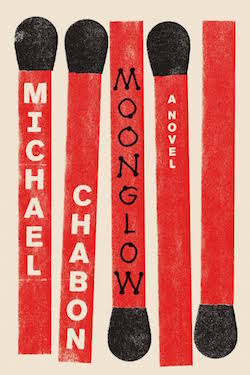
Thursday December 1st: Moonglow Reading
Michael Chabon’s latest novel combines rocket science, deathbed confessions, and family secrets into one memoirish novel. Ostensibly a story about Chabon’s dying grandfather, Moonglow is quieter and more direct than some of his other novels, and its realism and relatively simple sentences might open Chabon up to a new audience. Seattle Public Library, 1000 4th Ave., 386-4636, http://spl.org. Free. All ages. 7 p.m.
Friday December 2nd: The Furnace Says Goodnight
See our Literary Event of the Week column for more details. Hollow Earth Radio, 2018 E. Union St., 617-1683, hollowearthradio.org. Free. All ages. 8 p.m.
Saturday December 3rd: Rainier Valley Lit Crawl
The fourth Rainier Valley Lit Crawl centers around Hillman City, venturing to, in order, Spinnaker Bay, Big Chickie, Adugenet, and Union Bar. Those four venues will host an array of authors including Daemond Arrindell, Sarah León, Fernando Pérez, Jekeva Phillips, Anastacia Renee, Thomas Walton, and Corina Zappia. Spinnaker Bay, 5718 Rainier Ave S., 725-2337, http://gregbem.com/. Free. All ages. 5 p.m.
Sunday December 4th: Urban Craft Uprising
Seattle’s largest craft show is a great place to cross off all the last-minute gifts on your holiday shopping list. You can find a little bit of everything here, but be sure to visit the seven papercraft exhibitors, including journal makers, book arts experts, and letterpress printers. Seattle Center Exhibition Hall, 4326 301 Mercer St, http://urbancraftuprising.com Free. All ages. 10 a.m.
Monday December 5th: Thank You for Being Late Reading
This reading from Thomas Friedman’s latest book, Thank You for Being Late, is ostensibly sold out, but many Town Hall events have last-minute seating available for people who show up and wait in line. Friedman’s latest book — about technology, globalization, and climate change — looks like it’s worth a few minutes of standing in the cold. Town Hall Seattle, 1119 8th Ave., 652-4255, http://townhallseattle.org. $5. All ages. 7:30 p.m.
Tuesday December 6th: The Way of the Writer Reading
Charles Johnson is a Seattle-area legend. The UW professor and National Book Award-winning novelist’s latest book collects a lifetime of learning under the ambitious title The Way of the Writer: Reflections on the Art and Craft of Storytelling. Tonight, Johnson will talk onstage with one of his prize students, the novelist David Guterson. Northwest African American Museum, 2800 S. Massachusetts St., 624-6600, http://elliottbaybook.com. Free. All ages. 7 p.m.Literary Event of the Week: The Furnace Says Goodnight

The catchphrase of The Furnace reading series is descriptive, intense, and memorable: “One Writer. One Story. Read to completion (with vigor).” It’s oddly sexual in tone — I can think of no other reading series in Seattle that is described with the same language as a handjob — but it’s exactly what you get when you show up for a Furnace reading.
Founded by Seattle writers Anca Szilagyi and Corinne Manning in 2012, the quarterly Furnace series has brought one writer to Hollow Earth Radio’s studios before a live studio audience to read a story that incorporates audio elements like music and sound effects. The reading is broadcast live on Hollow Earth, and audio recordings live forever on their website. If you’re looking for particular recordings to sample, the top two recordings on the Furnace’s Sound and Video page are great places to start.
Mattilda Bernstein Sycamore’s story “The Freezer Door” circulates through her interests: the increasingly conformist attitudes of modern American cities, sexuality, and the complexities of attraction. She moved to San Francisco in 1992 and joined in on the seemingly never-ending parade of hookup culture. Everyone, at the time, was kissing everyone. She explains, “this kiss didn’t necessarily feel like a radical act; it was just something you did when you were a faggot.”
And possibly the best Furnace is from October of 2015: Anastacia Renee Tolbert’s story “The City.” In her introduction, Szilagyi calls Tolbert “a queer superhero of color,” and that’s just about right. Not many poets would have the guts to read a narrative poem featuring the city of Seattle as a protagonist, but Tolbert pulls it off and makes it look effortless. Over a droning retro electronic soundtrack created by local sound collective WINDOWS95SECONDEDITION, Tolbert reads, “this city sits on itself like a tired woman after a long day of being black…we are beautiful in the rain because the rain makes us blurry.”
It’s a Seattle in crisis, a Seattle trying to find its own voice, a city distracted by coffee and body image. It’s the Seattle out our window. Later in “The City,” Tolbert announces that in Seattle, “we all have a story to tell and that’s why there are so many writers here.” That could just as easily have been an alternate, non-handjobby catchphrase for the Furnace, too.
This Friday, Manning and Szilagyi will present the last-ever Furnace reading. (“Corinne and Anca love you forever but we are in our 30s and need to finish our books,” a notice on The Furnace site says.) They’re violating one of the cardinal rules of the series with the finale: the final Furnace will feature not one writer but an army of them, made up of Furnace alumni including Sycamore, Tolbert, Chelsea Werner-Jatzke, Nancy Jooyoun Kim, and Buffy Aakaash. Szilagyi and Manning will fold contributions from all the writers together into a single story, with a soundtrack by WINDOWS95SECONDEDITION and The Shtick Figures. It will undoubtedly be read to completion (with vigor.)
Hollow Earth Radio, 2018 E. Union St., 617-1683, hollowearthradio.org. Free. All ages. 8 p.m.
Book News Roundup: The season of lists is upon us
It's the beginning of book list season, which is a holiday that I must admit kind of befuddles me. I'm not a list-maker. I find lists to be very unsatisfying. But many of you like them, and that is, of course, okay. I'd like to direct your attention to two of the biggest lists of the season: The New York Public Library has published its list of the top books for kids and teens and the New York Times published their 100 Notable Books of 2016. If you like your lists to be shorter and more local, the Seattle Public Library has published a terrific list of three "Bus Reads for November." I'm not going to link to every list on this site, but I'll make note of the especially worthy ones in days to come.
Hamilton creator Lin-Manuel Miranda has announced that he's producing a TV and movie series based on the popular Kingkiller Chronicle fantasy trilogy.
An Amazon employee leapt from a building on the online booksellers' South Lake Union campus yesterday after emailing a number of Amazon employees including founder Jeff Bezos. The person is in medical care with "non-threatening injuries."
